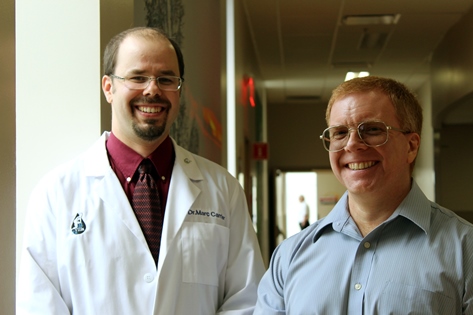
When Jamie Dossett-Mercer (right) asked a question of Dr. Marc Carrier about blood thinners, the patient was impressed that Dr. Carrier did formal research to find the answer.
Physicians around the world now have guidance to help them determine the best oral blood thinners to use for their patients suffering from blood clots in their veins, thanks to a patient of The Ottawa Hospital who asked his physician a question he couldn’t answer.
“Right there in the clinic, he identified an important knowledge gap for clinicians. We decided to act on it and find the answer,” said hematologist Dr. Marc Carrier, who is also a scientist at The Ottawa Hospital and associate professor at the University of Ottawa.
Dr. Carrier was treating Jamie Dossett-Mercer for major blood clotting in his leg veins, called deep vein thrombosis, that reached from his ankle to his groin. If one of these clots were to break off, it could travel to his lung and cause a pulmonary embolism, which is often fatal.
In recent years, a number of new oral anticoagulants have been approved for use. Faced with eight possible therapies, Dossett-Mercer asked, “How do all these different blood thinners compare head-to-head?”
Dr. Carrier went looking for the answer. Although he found dozens of trials that studied the effects of different agents separately, none had analyzed all the results together. His team reviewed 45 randomized trials (involving nearly 45,000 patients) using a process called network meta-analysis, which allows them to set a baseline treatment and compare all the other treatments to that. All the clinical trials they found compared the newer treatments to the standard of care, which is low-molecular-weight heparin (LMWH) with vitamin K antagonists.
They found some notable variations.
- A higher percentage of patients taking the unfractionated heparin-vitamin K antagonist combination experienced a recurrent blood clot within three months.
- A lower percentage of patients taking rivaroxaban and apixaban experienced a major bleeding event within three months.
“I was already impressed with Dr. Carrier’s exceptional care,” said Dossett-Mercer. “But that he would do this research based on a patient question is just astounding.”
Dr. Carrier’s results and guidance are in a study published by the Journal of the American Medical Association.

Support patient care and research at
The Ottawa Hospital


 To reset, hold the Ctrl key, then press 0.
To reset, hold the Ctrl key, then press 0.
Comment on this post